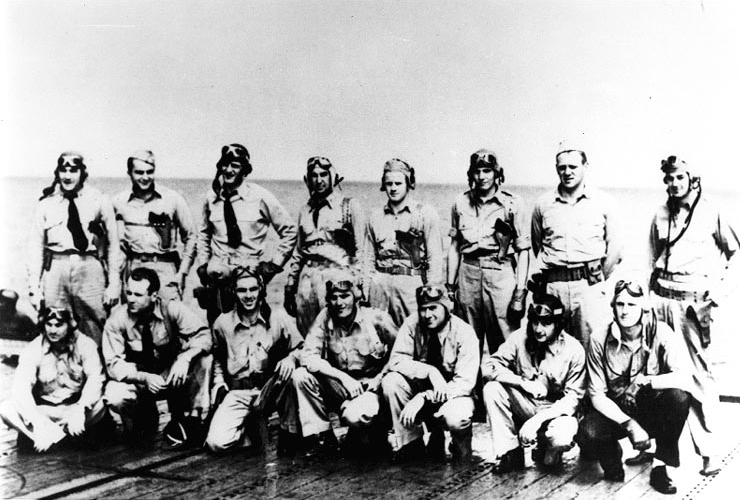Even in a big country like this one, we can have trouble fathoming how big China is. I was just thinking, China has a bit more than a billion people...
about 1.3 billion on the 2007 numbers. You know it's a big country when the rounding error is the population of the U.S. (latest CIA estimate, 307 mm). China feeds about 20% of the world's people on 7% of the world's arable land.
Remember that Drew Carey joke? 'My dick is so big it has it's own dick. And even my dick's dick is bigger than your dick.' Where population is concerned, that's a pretty good description of China.
The supernumary appendage in this case is the diaspora.
Wikipedia estimates that there are 40 million or so Chinese living outside China's traditional territory. Add 23 mm in Taiwan and 7 mm more in Hong Kong, and you have about 70 million ethnic Chinese living outside the PRC system. Taken as one country this population would rank #19 in the world, a bit behind Iran and a little ahead of France.
And I don't think it's particularly radical to think of it that way. China has made recapturing the largest elements of the diaspora - Hong Kong and Taiwan - a strategic priority. But this is a population that is not keen on being recaptured. In the generation or so since they were cut off (say, from the 1950s), they have prospered immensely:
They have done very very well on their own, thank you.
The extraordinary success of these city-states, as well as the Chinese in the U.S., draws the eye away from another story - that of the communities that have not done so well. These smaller concentrations, mostly in countries where Chinese were in the minority, have had a rougher go of things. In some cases they have disappeared entirely.
For many years there was a
vibrant Chinese community called Cholon in Saigon. Gontran de Poncins, the French nobleman famous for his
account of life among the Inuit, stayed there for awhile after World War II. His
book about the experience, written two years before
Dien Bien Phu, is an invaluable snapshot of the neighborhood's last few years of peace.
Cholon was heavily damaged in the Tet Offensive
, and many inhabitants fled the war and subsequent communist rule.
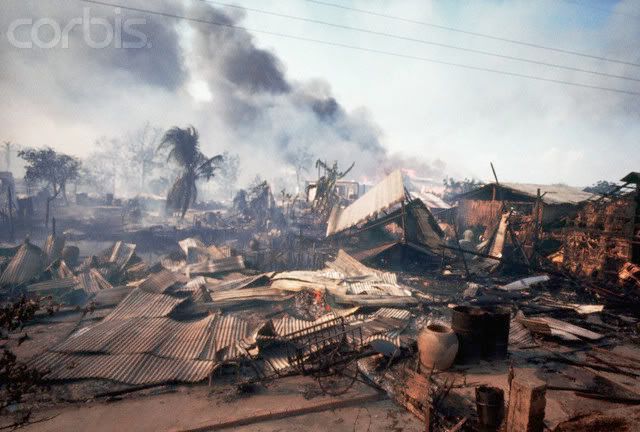
(It's in better shape
today.)
In Burma, the Chinese community
was wrecked, along with everything else in the country, by Ne Win's
nationalization program. This shut down the Chinese schools, sometimes, according to reports, by burning them. (Sometimes, according to reports, with the students still in them.)
I'd tell you about the Indonesian riots of the 1960s, and the exciting
reunion tour of 1998, but you're getting the idea, right?
The Malaysian Chinese were a little bit lucky in this regard. In 1969 they were, like their Burmese and Indonesian counterparts, on
the wrong end of a pogrom. It has become increasingly clear as documents are declassified that the official version overstated Chinese involvement in the outbreak, and understated the body count. But it was one of those rare civil disturbances that scares people back from the brink. It ended quickly, was confined primarily to Kuala Lumpur, and led to serious efforts to improve ethnic relations in Malaysia.
So the Chinese were able to stay (although Singapore, noting the wind direction, had seceded in 1964). Unlike his Burmese counterpart,
Mahathir bin Mohamad's agenda was not one of isolation or ethnic purification, but an amalgam of nationalism and export-driven economic growth. Malaysia looked outward, and became famous for its neurotic
pursuit of world records,
landmark skyscapers, and maverick economic policy (encouraged, by the way, by a
certain bearded guy we know).
Along the way a smallish majority-Chinese city called Penang
kind of got lost in the shuffle.
Situated on the Andaman Sea, Penang was once a key port in the British Empire, famous for its
verdant hills,
temples and
clan houses, and the graceful lines of
Fort Cornwallis :
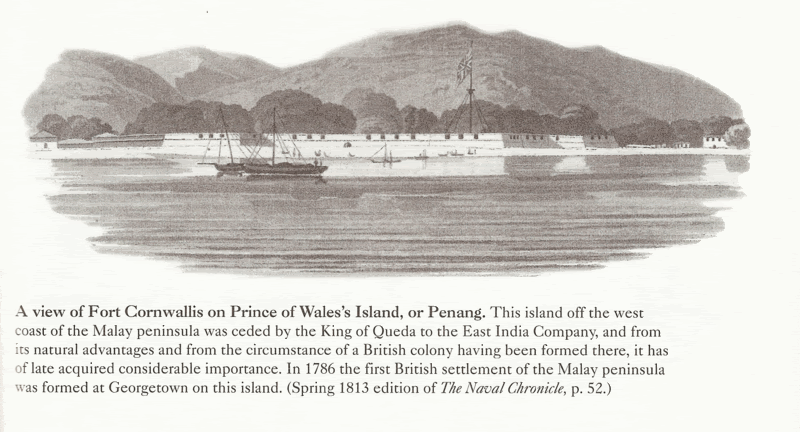
Its fame, or perhaps notoriety, was further enhanced when it became the site of the aforementioned
Emden's greatest exploit, the Llap-Gochian
destruction of the Russian cruiser Zhemchug. (After I wrote my essay on
Emden, I found a major contemporary
New York Times report on the event, which you can read
here.)
The headline faded, the world's attention moved on. Penang, once synonymous with the exotic east, became a distant memory, and then, in most minds, nothing at all. If that were not enough, it was unfortunate enough to be the place where S.J. Perelman lost his mind in
Westward Ha!All together I spent three and a half weeks in Penang before The President Monroe nosed over the horizon, and this much I will say for it: if you ever want a perfect honeymoon spot, a place where the scenery and climate fuse to produce unadulterated witchery, where life has the tremulous sweetness of a plucked lute-string and darkness falls all too soon, go to the Hotel Plaza in New York.
Of all the lethargic, benighted, somnolent fleabags this side of Hollywood, the port of Georgetown on the island of Penang is the most abysmal. At the time I was there, its recreational facilities consisted of four Tarzan films, a dance hall housing eighty-five pockmarked Malay delinquents, a funicular railway, and a third-rate beach situated five miles from nowhere.
If, after exhausting the potentialities of these, you retained any appetite for sightseeing, you could visit the Ayet Itam temple and botanical gardens. The former is possibly the largest, and unquestionably the dullest, Buddhist temple in Malaya, and no wastebasket is complete without a snapshot of this historic shrine.
Well, New Yorkers don't travel well. But he's right about the beach. Batu Ferringhi ("Foreigners' Rock"), is pretty awful. This may not be obvious from
the pictures. But three things conspire to spoil a
remarkably beautiful natural setting. First, it's
overbuilt - not quite Ft. Lauderdale, but you can tell they'd like to get there. Second, it's wall-to-wall Saudis, and nothing says "pool-ready!" like a dozen or so black burkhas. And third, there's a mosque
right there by the beach - with enormous loudspeakers - to make sure that you, the tourist, do not miss your pre-dawn Call to Prayers.
The one good thing about Batu Ferringhi is, it's five miles out of town.
The real Penang is Georgetown, the old city. Nestled among green hills, it fronts a lovely natural harbor. You can take
the bridge over from the mainland, but I prefer the old ferries:
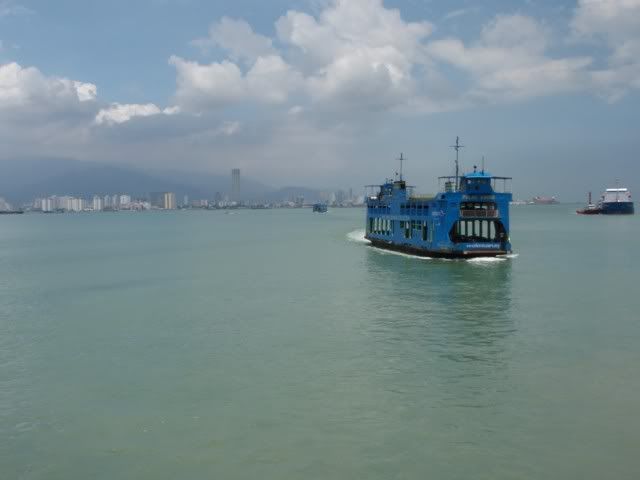
There's no center, really. You just walk around. The Georgetown vernacular is
a jumble of modern buildings and traditional
shophouses (store on ground floor, family apartment upstairs). It's a little decayed, and at night even
desolate, but the more you hang around, the more
cool things you see.
The people are nice and the food is good. Well, actually, the food is not good - it is celestial...beyond category. Fresh produce and fish caught that morning, sauced in Indian curries with Malay spices...there is nothing else like it. For the cost of coffee and a roll at the Plaza, you can have three courses of the best food you can imagine, with change left over for the Tarzan movie. Try the
hokkien mee,
claypot noodles, and
roti canai, with sweets after, washed down with
madras coffee. Or just order randomly, it doesn't really matter - nothing tastes bad. It's amazing. For Anthony Bourdain to do shows from
Malaysia and
Singapore and
not spend time in Penang - good
God, what a blunder. It would be like going to Padua and skipping the Scrovegni Chapel.
Maybe one reason Penang's not front page news is a bit of shame on the part of Malaysia. Malaysia styles itself as big, new, modern. (Did you know Malaysia has over 200 golf courses?) Penang is a beaten-up old town. The more you poke around in it the more you see the old Malaysia, the country they're trying to stop being.
We visited a family acquaintance there, an old man. A few years before I was born he rented a bit of land, and with the help of some friends poured a concrete slab on it. He built a house and planted a banana tree in the back yard. Fifty years on he was still living there, sitting on the cool cement floor and watching 'Malaysian Idol' on an old Sony. He had a motorbike parked by the refrigerator, and a nice simple bedroom with mosquito netting. The breeze came off the ocean, up the street, and ran lightly through the eaves. It wasn't the sort of place the tourist authority would feature, but it worked for us.
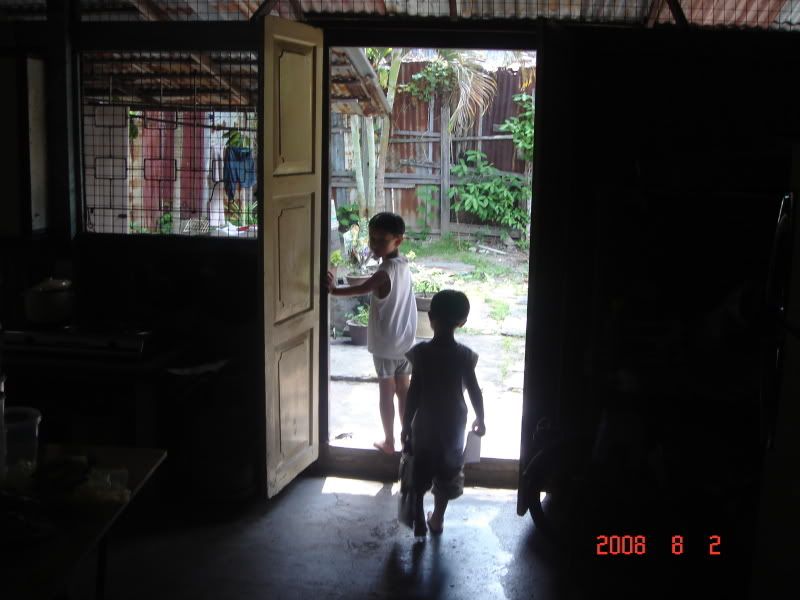
So maybe it's ok that the world has forgotten about Penang. Sometimes it's better to not be noticed - easier to be yourself that way. Penang has none of the self-importance of the modern Asian megacities, none of the brusque you-can't-afford-to-be-here attitude, none of the self-conscious vanity. It's just a nice place, with nice people, good food, and interesting things to see
.
I kind of miss it.







